Barack Obama's foreign policy legacy, and his Nobel Peace Prize, are looking more questionable than ever
Jimmy Carter's reputation only grew in his post-presidency years, but Obama's may suffer the reverse fate given the consequences of his lack of military intervention in Syria
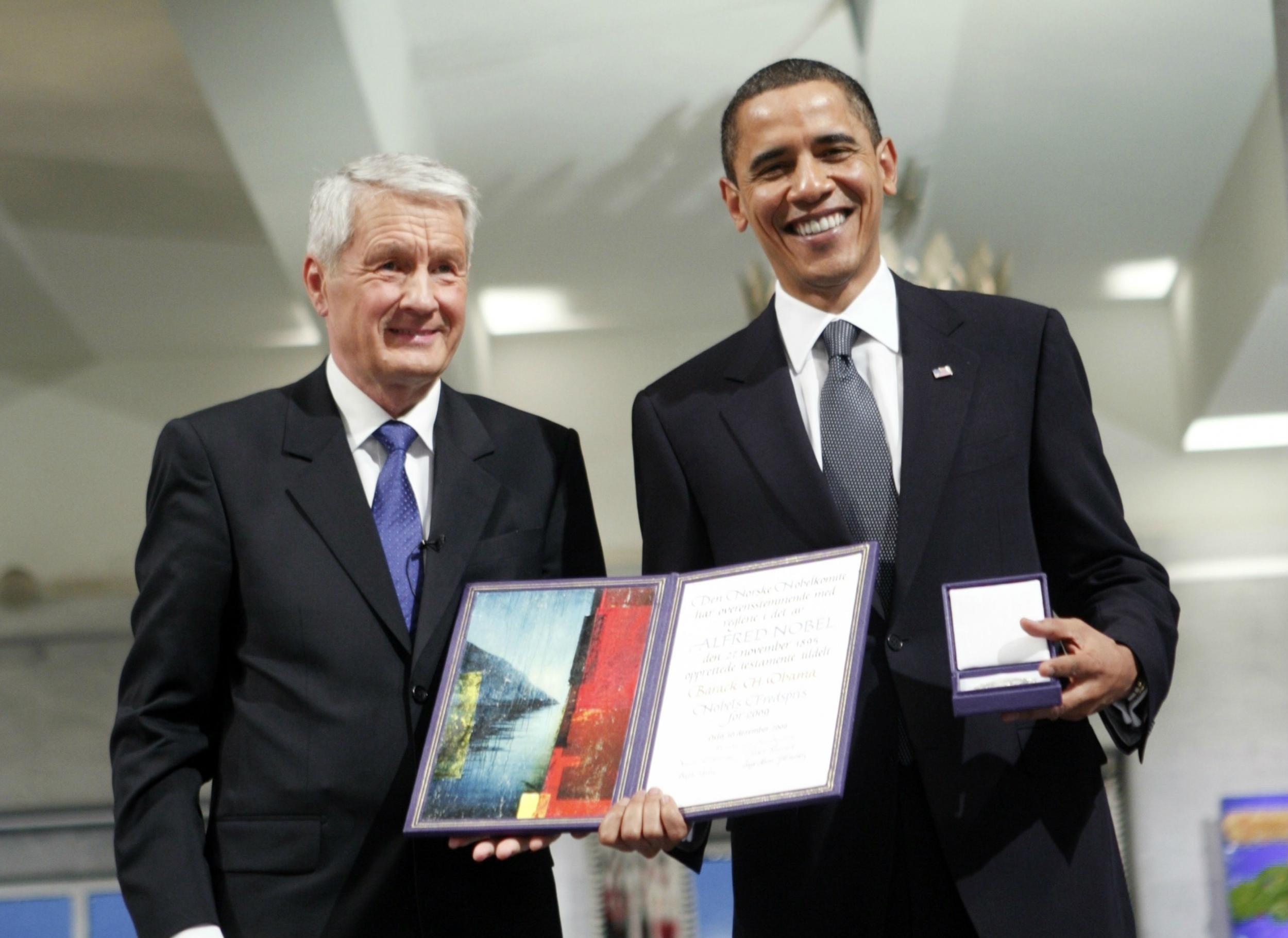
I am guessing that when Jimmy Carter glimpses his Nobel Peace Prize on the bedroom mantle, he smiles with pride. Barack Obama should wince when he thinks of his, especially in light of the past few days, but I am guessing he doesn’t. Humility has never been his middle name.
The brand new President had barely filled his underwear drawer in the White House when his gong from Oslo landed. The Norwegian Nobel Committee announced the award in October 2009, citing his “extraordinary efforts to strengthen international diplomacy and cooperation between peoples”. They particularly liked his commitment to nuclear non-proliferation.
Some asked at the time why they hadn’t waited until after Obama was done being President before assessing his contribution to world tranquillity. Carter only got his prize in 2002, in recognition less for his achievements as Commander-in-Chief from 1977-1981 and more for all that he did afterwards.
In Atlanta this week, I am again reminded of how much better the follow-up act has been for America’s 39th President and former Georgia peanut farmer and Governor – now 92 years old and in remission from cancer. His legacy has been a virtual negative image of his single term in the Oval Office when his approval rating dipped as low as 29 per cent.
Partly this is because of the humanitarian, disease prevention and deconfliction work of the Carter Centre in Atlanta that he founded with his wife Rosalynn two years after leaving office.
Also, history tends to be kinder to US presidents when they’re retired. The most recent retrospective survey by Gallup shows Carter with a 56 per cent approval number, compared with 34 per cent when he left office. Even Nixon’s numbers trended up eventually.
Most impressive is Carter’s sheer staying power. He was the first ex-president to say he would be attending the inauguration of Donald Trump. Just hours before Trump fired his Tomahawks at Bashar al-Assad in Syria, Carter was to be found decrying the President’s record to students of Emory University in Atlanta on everything from his treatment of women to his discounting America’s responsibility for defending human rights worldwide including those of blacks in America. “I don’t see any glimmer of hope within the administration itself,” he added.
The reputation of Obama, barely out of office, is now in peril thanks precisely to that attack on Syria, ordered by Trump in response to the alleged use of chemical agents against his people, notably a gas attack that killed 80 innocent civilians including babies. What Assad had seemingly perpetrated in an instant shredded Obama’s claim that his deployment of diplomacy did more to preserve world peace than the use of military power could ever have done.
Even some of his loyalists were dismayed when Obama warned the regime in Damascus that using chemical weapons in its civil war was his red line for military intervention, only to back off and do nothing when in 2013 it was actually crossed. His excuse was that he didn’t have the votes for a military strike in Congress. A former senior aide to the Democratic leadership in the Senate at that time tells me that Obama was being disingenuous and that had he taken the decision to launch a strike without congressional approval, “we would have had his back”.
In any event, Obama, helped by Secretary of State John Kerry, moved to rescue himself by recruiting Moscow to force Assad to give up his entire chemical arsenal. That, we were duly told, is exactly what happened. The entire arsenal. “We got 100 per cent of the chemical weapons out,” Kerry would say later. The deal, Obama claimed, meant the “elimination of Syrian chemical weapons in a transparent, expeditious, and verifiable manner”.
Talking to Jeffrey Goldberg of The Atlantic in 2013, Obama was smug. “The overwhelming weight of conventional wisdom and the machinery of our national-security apparatus had gone fairly far [towards military action] ... the fact that I was able to pull back from the immediate pressures and think through in my own mind what was in America’s interest ... was as tough a decision as I’ve made – and I believe ultimately it was the right decision to make.”
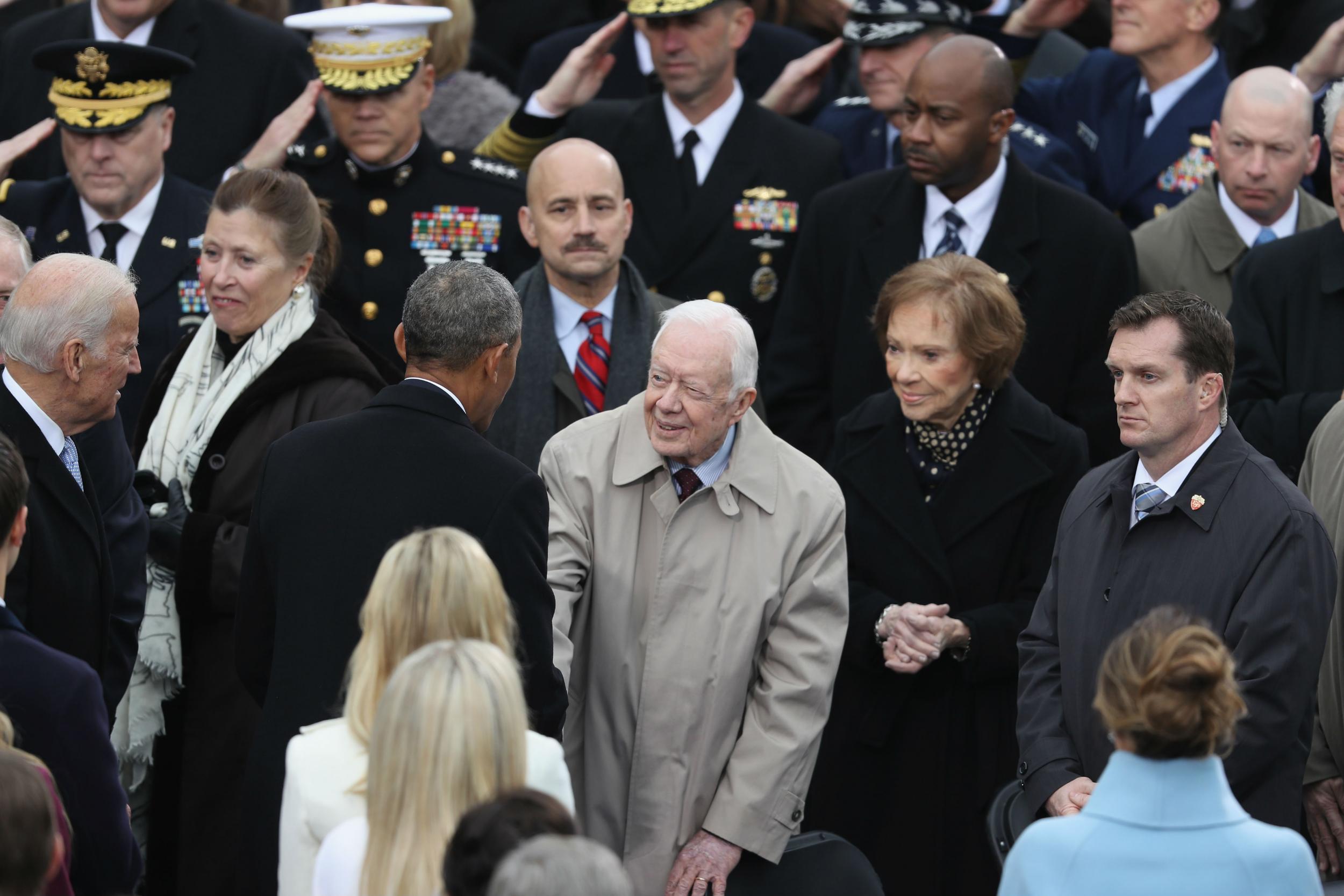
We now know better. Did the Obama administration really imagine that the regime in Damascus would surrendered every ounce of sarin gas it had or that Russia would really work so diligently to make sure that it would be the case? Were they that naive or prone to wishful thinking? Or was it simply glossing over the truth to repair the Commander-in-Chief’s reputation?
Michael Mullen, the chairman of the Joint Chiefs of Staff under Obama, seemed perturbed in an interview on PBS after the Trump strike. “What has been a little surprising – to me, anyway – is to find out through media that there actually have been several chemical attacks recently," he attempted. "Now, with some belief on my part, and I think a lot of people, that we thought we got rid of the chemical weapons with the regime that President Obama and President Putin put in place.”
The exposure of this miscalculation, or whatever it was, has unsurprisingly triggered a new round of scepticism about that other deal Obama liked to boast about, the one giving Iran sanctions relief in return for its agreement to pause its alleged pursuit of a nuclear capability and to submit itself to international monitoring. Again, Obama called it a deal that was “verifiable”. To which we are surely now entitled to ask, is that so? Hardly was the ink dry on that pact before word leaked of the administration secretly paying Tehran $400m in exchange for the release of US hostages. How may other side deals were agreed we still don’t know about?
Victor Davis Hanson of the Hoover Institution at Stanford University argued in the National Review this week that Obama is starting to resemble Stanley Baldwin, who led a period of peace as British Prime Minister from 1935 to 1937 that quickly turned out to be a false peace.
“Both seemed to believe that war breaks out only because of misunderstandings that reflect honest differences,” Hanson writes. “Therefore, tensions between aggressors and their targets can be remedied by more talk, international agreements, goodwill and concessions. Ideas such as strategic deterrence were apparently considered by both Baldwin and Obama to be Neanderthal, judging from Baldwin’s naive efforts to ask Hitler not to rearm or annex territory, and Obama’s ‘lead from behind’ foreign policy and his pledge never to ‘do stupid s***’ abroad.”
In the short term, Obama now has a huge hole in the memoir he is must now write to try to put his legacy off on the right footing. It’s possible he can still convince himself that he did the right thing back in 2013 but it’s hard to see how. By not punishing Assad for using chemical weapons and forging an illusory deal to get them out of his hands, he left the way open for the chemical-weapons atrocities that have happened since. He will lose another whole chapter if it emerges that the Iran deal – which, by the way, applies for 10 years only – begins to fray.
Obama’s wider legacy as the first African-American president may not be undone because of events surrounding two countries in the Middle East. But it could be seriously damaged by them. In that event, his best bet would be to do as Carter did: surpass the achievements of his years in office with the achievements of those in retirement. He is still relatively young, after all.
If you’re asking, two other US presidents won the Nobel Peace Prize. They were Theodore Roosevelt for helping to resolve the Russo-Japanese war in 1906 and Woodrow Wilson in 1919 for helping create the League of Nations. Both men were serving in the Oval Office when they received them. How their legacies later matched up is a discussion for another time.

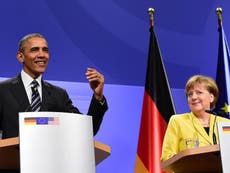
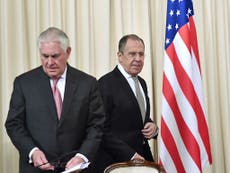
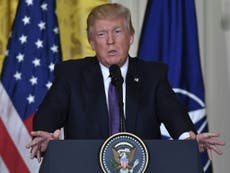
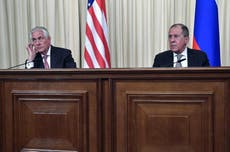
Join our commenting forum
Join thought-provoking conversations, follow other Independent readers and see their replies